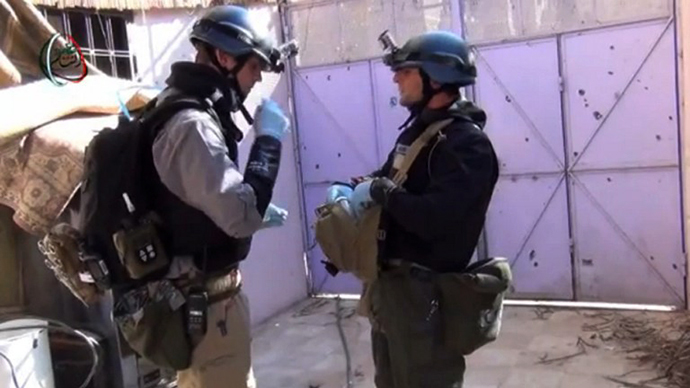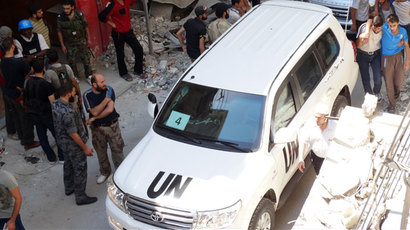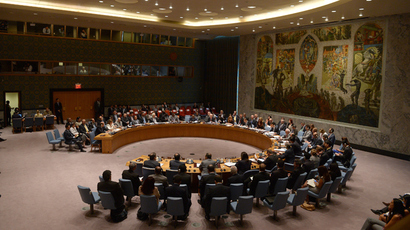Intl сhemical disarmament team begins destroying Syria arsenal, machinery
The UN confirms chemical experts in Syria destroyed missile warheads, aerial bombs, and chemical mixing equipment on Sunday as they started eliminating the country’s chemical weapons.
"The process of destroying Syria’s chemical weapons program began today," said a statement released by the United Nations and the Organization for the Prohibition of Chemical Weapons.
The experts supervised Syrian personnel who "used cutting
torches and angle grinders" to make sure the weaponry could
not be used, the statement read.
"The process will continue in the coming days."
The team crossed into Damascus on Tuesday tasked with dismantling Assad's estimated 1,000-ton chemical weapons stockpile.
A UN official earlier confirmed to AP that the weapons inspectors
have begun to destroy the stockpile and machinery.
Earlier this week, a Hague-based OPCW official stated that all
“expedient methods” would be used to ensure Syria’s
production facilities would be rendered unusable. He added that
procedures might entail the use of explosives, sledgehammers, or
the pouring in of concrete.
“We're very transparent. The experts can go to every site.
They are going to have all the data from our government,”
Assad told German magazine Der Spiegel on Sunday.
The mission follows a UN resolution which demanded that Syria’s
chemical weapons arsenal be destroyed. The procedure to purge the
country of chemical weapons stocks has a target finish date of
mid-2014.
The US and its allies have been threatening Syria with military
action in response to the August 21 attack in Damascus's eastern
Ghouta suburbs, when UN experts say sarin gas was used “on a
large scale.”

Both Syria’s government and rebel forces have accused each other
of using chemical weapons, and both sides have denied carrying
out attacks.
The US and Britain were quick to accuse the Assad regime of
perpetrating the August 21 attack, based on the warheads’
technical characteristics, established by UN experts.
Russia and Syria accused the US and its allies of jumping too
quickly to conclusions. Damascus claimed that the UN had ignored
evidence passed to them confidentially. Russia, who believes the
Aug.21 attack was a provocation by the rebels, has been calling
for a so-called “Geneva-2” peace conference.
The UN Syria peace envoy, Lakhdar Brahimi, said on Sunday that it
was not certain that mid-November peace talks will take place in
Geneva as planned. “This is not a certainty…I am encouraging
everybody to come to Geneva in the second half of November,”
he said in an interview with TV5 television and RFI radio.
Long-term plan for eliminating stockpiles
Alongside the aforementioned usage of explosives and
sledgehammers, a larger piece of chemical processing equipment
will play a role in the destruction of chemical weapons
stockpiles.
In early November, a mobile and highly developed disarmament
system will be constructed, according to the New York Times.
The Field Deployable Hydrolysis System will probably be set up
outside the country, in order to neutralize large quantities of
chemicals that are to be transported outside the country’s
borders. The process will see the conversion of chemical agents
into compounds which cannot be put to military use.
A US state department official told the New York Times that the mobile system is an “early demonstration” that steps are being made to shrink the weapons’ arsenal.
The UN inspectors have said that the success of their work depends on getting cooperation both from the Syrian government and the opposition. The opposition was disappointed by the diplomatic solution to Syria’s chemical weapons stockpile and are therefore the most likely element to disrupt the work of the UN team, Tariq Ali, a historian and Middle East expert, told RT.
“Whether sections of the opposition are going to disrupt the inspectors from taking off and disarming the chemical weapons, I don’t know. It wouldn’t totally surprise me if some sections from within them tried to create a provocation and then blame it on the government because they were very upset when no war (American airstrikes) happened,” he said.














